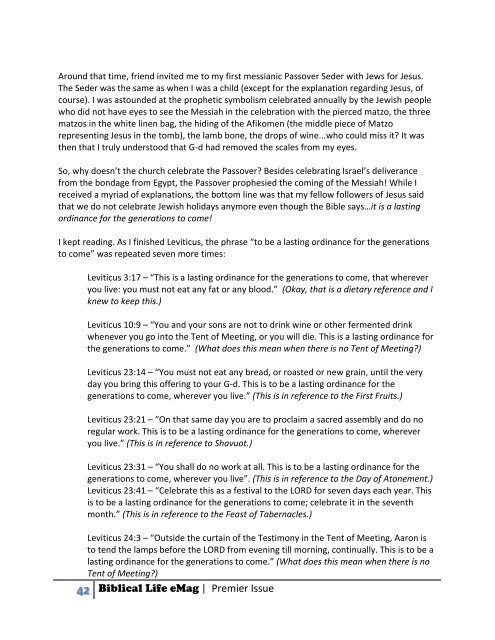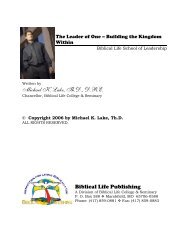Biblical Life eMag - Biblical Life College & Seminary
Biblical Life eMag - Biblical Life College & Seminary
Biblical Life eMag - Biblical Life College & Seminary
Create successful ePaper yourself
Turn your PDF publications into a flip-book with our unique Google optimized e-Paper software.
Around that time, friend invited me to my first messianic Passover Seder with Jews for Jesus.<br />
The Seder was the same as when I was a child (except for the explanation regarding Jesus, of<br />
course). I was astounded at the prophetic symbolism celebrated annually by the Jewish people<br />
who did not have eyes to see the Messiah in the celebration with the pierced matzo, the three<br />
matzos in the white linen bag, the hiding of the Afikomen (the middle piece of Matzo<br />
representing Jesus in the tomb), the lamb bone, the drops of wine...who could miss it? It was<br />
then that I truly understood that G‐d had removed the scales from my eyes.<br />
So, why doesn t the church celebrate the Passover? Besides celebrating Israel s deliverance<br />
from the bondage from Egypt, the Passover prophesied the coming of the Messiah! While I<br />
received a myriad of explanations, the bottom line was that my fellow followers of Jesus said<br />
that we do not celebrate Jewish holidays anymore even though the Bible says it is a lasting<br />
ordinance for the generations to come!<br />
I kept reading. As I finished Leviticus, the phrase to be a lasting ordinance for the generations<br />
to come was repeated seven more times:<br />
Leviticus 3:17 This is a lasting ordinance for the generations to come, that wherever<br />
you live: you must not eat any fat or any blood. (Okay, that is a dietary reference and I<br />
knew to keep this.)<br />
Leviticus 10:9 You and your sons are not to drink wine or other fermented drink<br />
whenever you go into the Tent of Meeting, or you will die. This is a lasting ordinance for<br />
the generations to come. (What does this mean when there is no Tent of Meeting?)<br />
Leviticus 23:14 You must not eat any bread, or roasted or new grain, until the very<br />
day you bring this offering to your G‐d. This is to be a lasting ordinance for the<br />
generations to come, wherever you live. (This is in reference to the First Fruits.)<br />
Leviticus 23:21 On that same day you are to proclaim a sacred assembly and do no<br />
regular work. This is to be a lasting ordinance for the generations to come, wherever<br />
you live. (This is in reference to Shavuot.)<br />
Leviticus 23:31 You shall do no work at all. This is to be a lasting ordinance for the<br />
generations to come, wherever you live . (This is in reference to the Day of Atonement.)<br />
Leviticus 23:41 Celebrate this as a festival to the LORD for seven days each year. This<br />
is to be a lasting ordinance for the generations to come; celebrate it in the seventh<br />
month. (This is in reference to the Feast of Tabernacles.)<br />
Leviticus 24:3 Outside the curtain of the Testimony in the Tent of Meeting, Aaron is<br />
to tend the lamps before the LORD from evening till morning, continually. This is to be a<br />
lasting ordinance for the generations to come. (What does this mean when there is no<br />
Tent of Meeting?)<br />
<strong>Biblical</strong> <strong>Life</strong> <strong>eMag</strong> | Premier Issue



